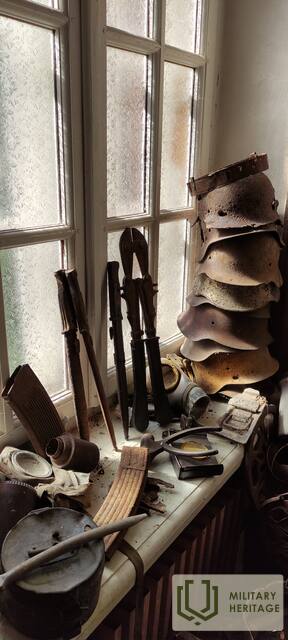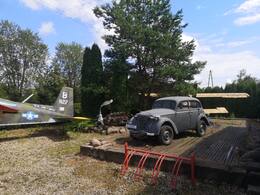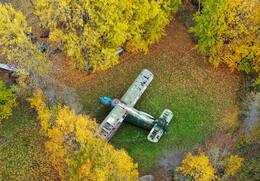Apie rastus karo artefaktus
Šiuolaikinėje Latvijoje įvairių muziejų kolekcijas papildo ir asmeninės privačių asmenų kolekcijos, kurios dažnai eksponuojamos viešai ir yra prieinamos visiems. Daugelis žmonių turi pomėgį seniems daiktams, įskaitant su karo istorija susijusius daiktus. Dažnai lankytojai nė nenutuokia apie šių daiktų kilmę. Ar jie atsirado staiga? Visais atvejais tai kelių metų darbas ir įdomi, asmeniška istorija apie vieno žmogaus pomėgį kolekcionuoti daiktus, siekiant iš jų sukurti, pavyzdžiui, muziejų. Pasakotojas aprašo savo asmeninę patirtį, suteikdamas skaitytojui supratimą apie situaciją Latvijoje po Antrojo pasaulinio karo. Įvairių armijų paliktas palikimas ir reikalingų žaliavų trūkumas ūkyje verčia žmones ieškoti kūrybiškų būdų, kaip panaudoti praktiškai bet ką, kad išgyventų. Laikui bėgant, tai, kas ūkyje nebenaudinga, tampa vertingais, istoriniais eksponatais, pasakojančiais apie Latvijos ir jos žmonių patirtį.
„Kiek žinau, po karo mūsų apylinkėse buvo išsibarstę tik lengvoji artilerija ir kulkosvaidis. Rusiškas 45 mm prieštankinis pabūklas su ištrauktu užraktu iki 1960 m. ar šiek tiek ilgiau gulėjo krūmuose pakelėje. Taip pat prie ežero krūmuose stovėjo „Maksis“ (K.Š. „Maxim“ sistemos kulkosvaidis), pats jį mačiau vaikystėje, pionieriai jį nutempė į metalo laužą. Buvo ir dar vienas, vienas iš dėdžių jį surinko ir užkasė kažkur prie namo. Klasės draugas su krikštatėviu nesėkmingai ieškojo „MG“ (vokiško K.Š. „Domāts“ kulkosvaidžio), kurį krikštatėvis užkasė prieš 40 metų. Po melioracijos situacija pasikeitė.
Žinau, kad tame lauke, netoli namo, kuriame buvo įsikūrusi rusų ligoninė, buvo tvenkinys. Tvenkiniai buvo pripildyti sužeistųjų ir žuvusiųjų ginklais. Po melioracijos tvenkinys buvo užpiltas, o namai nugriauti. Jis nebeturi vietos gyvenime.
Po 1944 metų vasaros mūšių netoli Stekių buvo surinktas sunkvežimis nukritusių „plinkšnių“ (K.Š. Domāti ginklų) ir nuvežtas į Jėkabpilį. Sunkvežimis nepasiekė galutinės kelionės vietos, dingo kartu su vairuotoju ir juo važiavusiu Čekos leitenantu. Iki 1990-ųjų milicija ir Čeka bandė išsiaiškinti, ar kas nors ką nors girdėjo apie šią bylą. Apie 1995 metus sužinojau, kad to sunkvežimio variklis tikriausiai buvo kažkokiame name. Deja, jis buvo sunkus, ir artimiausias muziejus nesidomėjo jo pirkimu. Metalo laužo surinkėjai variklį iš tetos nupirko už 10 latų. Visi liudininkai mirė niekam nepranešę.
Karo metu sudužusius lėktuvus vokiečiai atidalijo į metalo laužą. Taip pat ir 1941 m. paliktas rusų patrankas. Girdėjau, kad vienas kasėjas metalo detektoriumi rado tokių „puškų“ (K.Š. Domatų patrankų) gabalų. Mano pusėje palei drenažo griovius vis dar gali gulėti vokiško tanko „T-4“ skeveldros. Po sėkmingo mūšio su keturiais „T-34“ (K.Š. Raudonosios armijos tankais) ir dviem „SU-76“ (K.Š. Raudonosios armijos savaeigėmis artilerijos instaliacijomis) vokiečiai numušė rusišką IL-2 (K.Š. Raudonosios armijos atakos lėktuvą). Aplinkiniuose ūkiuose vis dar mačiau didelių geležies gabalų iš to mūšio. Didžioji dalis visko atiduota į metalo laužą. Net ir šiandien po vienu iš kelių stovi „T-34“ be bokštelio. Vieta pelkėta, bokštą nugriovė, nutempė į kolūkio dirbtuves, bet remontuodami kelią užpylė žvyru. Bokšto šarvai puikiai tiko skaldymo kirviams. Vieną tokį nusipirkau iš vietinių metalo laužo supirkėjų.
Karo lėktuvus ir tankus, kurie po karo dar mėtėsi, mano laikais jau buvo išvežę kolūkio laužo surinkėjai. Liko tik lėktuvų diuraliuminio skardos gabalai, kuriuos vietiniai naudojo kaip įrankius. Pavyzdžiui, vieno klasioko senelis buvo gaminęs langų žaliuzes. Vėliau jas iš klasioko atpirkau su kryžiumi.
Kalvis surinko visą geležį – tai jam buvo pelningas verslas, jis viską nukalė ant asilo ir pavertė naudingais namų apyvokos daiktais. Vyras mirė nesunaudodamas visų savo atsargų. Tad liko stovėti įvairūs tanko ratai, grandinių gabalai ir šarvai. Tas pats pasakytina ir apie kareivių šalmus – vidinės dalys buvo išplėštos (K. Š. Domātso vidinis šalmo amortizacinis įdėklas) ir panaudotos ūkyje. Ieškodamas buvusio riadžos, kurioje karo metu buvo laikomi vokiečių karo belaisviai, vietoje, vietinis gyventojas rado įvairių vokiečių armijos apdovanojimų.
Vietos kaimo gyventojai pasakojo, kad po karo mokykloje dingus elektrai, vaikų tėvai nusprendė išspręsti problemą. Jie iškasė vokiečių armijos automobilio variklį, kurį karo metu buvo užkasę ir vėliau panaudoję mokyklai. Karo metu vienas iš tėvų ant kelio buvo išmetęs plieninius smaigalius, ir atsitraukdamas per juos pervažiavo vokiečių sunkvežimis. Visos padangos buvo pradurtos, o „Fricas“ paliko sauskelnes pakelėje. Nakčiai variklis būdavo išimamas ir užkasamas. Tada, po kelerių metų, jis buvo įjungtas ir septynerius metus mokykla veikė su elektros generatoriumi. Šiais laikais žmonės yra pasirengę pirkti visus šiuos daiktus, bet anksčiau visa tai buvo mėtoma po aplinkinius namus, miškus ir pakeles kaip nereikalingos šiukšlės. Tai turėjo tik praktinę vertę – daiktą, kurį buvo galima perdaryti, patobulinti ir panaudoti ūkyje.
Susijusi laiko juosta
Susijusios vietos
Kavinė „Dakota“ ir karinės technikos bei įrangos ekspozicija
Kavinė „Dakota“ yra įsikūrusi Ogrės savivaldybėje, Ciemupėje, prie A6 greitkelio. Karinio paveldo ekspozicija leidžia jos savininkui suderinti savo pomėgį ir susidomėjimą karine istorija su kavinės verslu. Čia galite pasimėgauti maistu ir pamatyti XX a. pabaigos karinę techniką, ginklus, kareivių įrangą ir lėktuvus. Ekskursijos kavinės lankytojams prieinamos darbo valandomis. Ekskursijos vyksta tik rusų kalba, būtina išankstinė registracija.
Kuržemės tvirtovės muziejus Zante
Bus atidaryta nuo gegužės 1 d.








